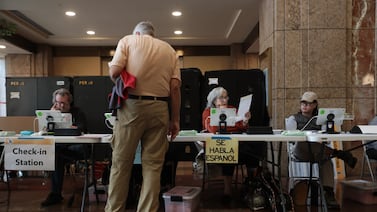Votebeat is a nonprofit news organization reporting on voting access and election administration across the U.S. Sign up for Votebeat Pennsylvania’s free newsletter here.
Officials uncovered a five-year-old case of double voting in Pennsylvania with the help of a voter roll maintenance program that has been the target of conservative attacks in recent years.
The case involved a man named Matthew Laiss, who moved from Pennsylvania to Florida in August 2020, and allegedly voted both in person in Florida and via mail ballot in Bucks County in that year’s November election, prosecutors said.
David Metcalf, the U.S. attorney for the Eastern District of Pennsylvania, announced charges against Laiss last week. Pennsylvania’s Department of State confirmed the alleged double vote was identified using data from the Electronic Registration Information Center, or ERIC. Metcalf also announced another set of fraud charges last week, in a case that was not discovered via ERIC.
The announcement that ERIC helped prosecutors uncover alleged double voting comes amid broader questions about the merits of the program. ERIC is a consortium comprising 26 states and the District of Columbia that collects state voter roll data and alerts its members to potentially inaccurate or duplicate voter registration records. It compares state datasets such as driver’s license databases, death records and voter rolls, along with other sources of information, to find cross-state or intra-state matches.
ERIC also helps identify eligible voters who aren’t yet registered. Pennsylvania’s deputy secretary of state, Jonathan Marks, chairs ERIC’s board.
One of its regular functions, Executive Director Shane Hamlin said, is a biennial report identifying possible double voting, the most recent of which came out in March of this year.
“While voter fraud is rare, this is a great example of why ERIC is a great tool,” Hamlin said, adding that the data it provides helps states investigate fraud and hand credible cases over to law enforcement.
Florida was a member of ERIC in 2020, making it possible for the system to compare that state’s voter roll data against Pennsylvania’s and discover the type of fraud allegedly committed by Laiss.
But Florida left ERIC in 2023, as did several other Republican-led states in recent years, following attacks from conservative activists and media outlets that accused it of focusing on working to register left-leaning voters rather than prioritizing cleaning voter rolls.
In the other case announced last week, prosecutors charged Miya Pack of Philadelphia with double voting in the 2024 election, in Pennsylvania and New Jersey. New Jersey only recently joined ERIC, and it hadn’t yet provided data for the program’s most recent analysis.
Carter Walker is a reporter for Votebeat in partnership with Spotlight PA. Contact Carter at cwalker@votebeat.org.




